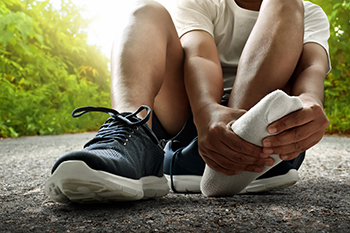
Pain in one’s toes can interfere with a running routine. Toe injuries while running can heal in a short amount of time with care and rest, but a more serious problem with a toe may derail a runner’s routine and set them back for longer than comfortable. Common toe problems in runners range from mild blisters to more serious hammertoes and stress fractures. A blister is caused by friction between the skin and shoes or socks. The outer layer of the skin separates from the inner layer and fills with lymph fluid. These are most common when a runner wears new shoes for the first time or increases their mileage. A hammertoe causes one or more of the smaller toes to bend upward. A corn or callus can develop on top of such a toe causing it to rub against shoes and the toe joint(s) can become swollen and painful. Stress fractures are common in teen athletes and are a result of overdoing runs. If a toenail becomes painful and begins to blacken, it might be runner’s toe. This is when the nail is under pressure because a shoe is too tight, or the toe is impacted repeatedly while running. Pressure causes friction between the nail and surrounding tissue. Fluid accumulates and blood capillaries break, causing the toenail to change color and pain to come on. The blackened toenail will eventually fall off, but this could take months. If you are a runner and you have toe pain, consult with a podiatrist who can diagnose the problem and determine how to best treat it.
Ankle and foot injuries are common among athletes and in many sports. They can be caused by several problems and may be potentially serious. If you are feeling pain or think you were injured in a sporting event or when exercising, consult with Dr. Lubrina Bryant from District Podiatry, PLLC. Our doctor will assess your condition and provide you with quality foot and ankle treatment.
Common Injuries
The most common injuries that occur in sporting activities include:
Symptoms
Symptoms vary depending upon the injury and in some cases, there may be no symptoms at all. However, in most cases, some form of symptom is experienced. Pain, aching, burning, bruising, tenderness, tightness or stiffness, sensation loss, difficulty moving, and swelling are the most common symptoms.
Treatment
Just as symptoms vary depending upon the injury, so do treatment options. A common treatment method is known as the RICE method. This method involves rest, applying ice, compression and elevating the afflicted foot or ankle. If the injury appears to be more serious, surgery might be required, such as arthroscopic or reconstructive surgery. Lastly, rehabilitation or therapy might be needed to gain full functionality in the afflicted area. Any discomfort experienced by an athlete must be evaluated by a licensed, reputable medical professional.
If you have any questions, please feel free to contact our office located in Washington, D.C . We offer the newest diagnostic and treatment technologies for all your foot care needs.